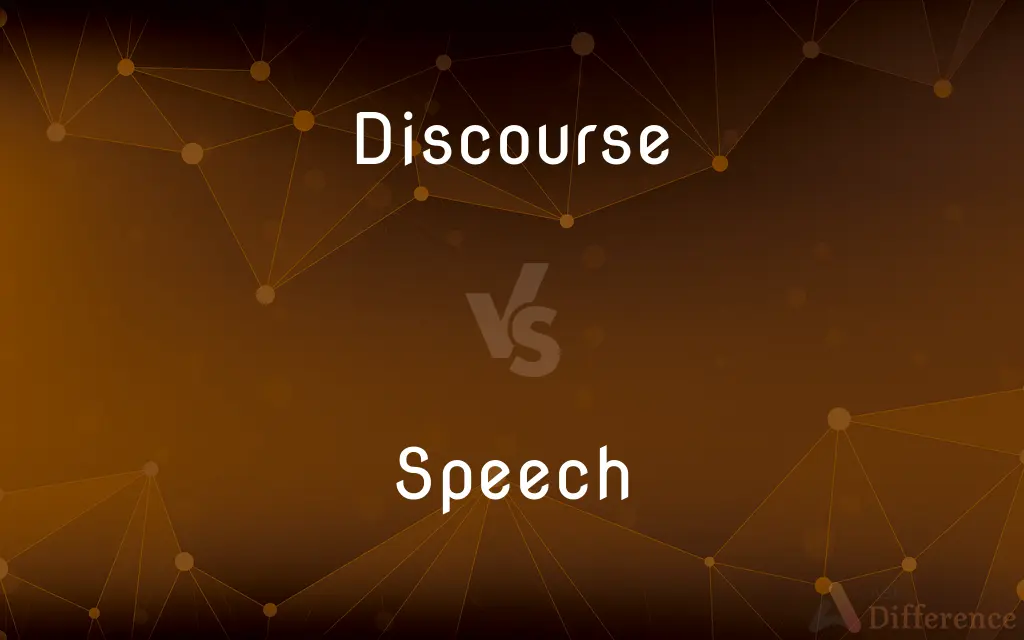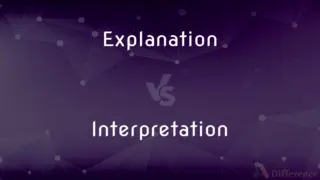Discourse vs. Speech — What's the Difference?
By Maham Liaqat & Fiza Rafique — Updated on March 6, 2024
Discourse involves extended verbal or written communication, focusing on the exchange of ideas, while speech refers to the act of speaking or a specific oral presentation.

Difference Between Discourse and Speech
Table of Contents
ADVERTISEMENT
Key Differences
Discourse encompasses a broader category of verbal and written communication, emphasizing the structured exchange of ideas over a certain length of time. It includes conversations, debates, lectures, and written texts, focusing on the flow and organization of ideas and information. Discourse can occur across various platforms and formats, engaging individuals or groups in dialogue or exploration of topics. On the other hand, speech is more narrowly defined as the act of speaking or delivering an oral presentation to an audience. Speeches can be formal or informal, ranging from public addresses and political declarations to casual talks, but they specifically involve vocal communication.
While discourse is concerned with the content, style, and structure of communication, examining how language constructs meaning and influences understanding, speech focuses on the delivery, tone, and effectiveness of oral communication. Discourse analysis looks at patterns, themes, and power dynamics within communication, whereas speech analysis might focus on clarity, persuasion, and vocal techniques.
Discourses are integral to shaping public opinion, cultural norms, and social practices through the collective exchange of ideas and information. They can manifest in academic research, media narratives, and social media discussions, illustrating the role of language in constructing societal understanding. Conversely, a speech, as a singular event or act, has the power to inspire, inform, or persuade individuals through direct vocal interaction, demonstrating the immediate impact of spoken word.
The development and dissemination of discourse involve complex interactions and the participation of various stakeholders in communication processes. It reflects broader societal conversations and the evolution of ideas over time. Speeches, however, are often crafted by individuals or small groups and delivered to specific audiences, highlighting the personal or organizational perspectives and the immediate context of the oral presentation.
Despite their differences, both discourse and speech play crucial roles in communication, education, and social interaction. Discourse fosters a deeper understanding and critical examination of topics, while speech enables direct and impactful communication, each contributing uniquely to the exchange of ideas and information.
ADVERTISEMENT
Comparison Chart
Definition
Extended verbal or written communication focusing on idea exchange.
The act of speaking or a specific oral presentation.
Scope
Broad, encompassing various forms and platforms.
Narrow, focusing specifically on oral communication.
Analysis Focus
Content, style, structure, and the construction of meaning.
Delivery, tone, persuasion, and vocal techniques.
Role
Shaping public opinion, norms, and understanding.
Inspiring, informing, or persuading an audience.
Manifestation
In conversations, debates, media, and academic texts.
In public addresses, political speeches, and informal talks.
Compare with Definitions
Discourse
Can be written or spoken, spanning various topics and contexts.
Political discourse shapes public opinion on policy issues.
Speech
Focused on vocal communication to an audience.
His speech on human rights drew widespread applause.
Discourse
Involves the social and cultural construction of meaning.
Media discourse influences societal perceptions of events.
Speech
Involves consideration of tone, pace, and articulation.
Effective speech delivery engages and retains audience attention.
Discourse
Analyzed for patterns, themes, and power dynamics.
Discourse analysis reveals the framing of gender roles in literature.
Speech
An act of speaking or delivering an oral presentation.
The keynote speech at the conference was inspiring.
Discourse
Structured communication that explores and exchanges ideas.
Academic discourse involves rigorous analysis and debate.
Speech
Can range from formal to informal presentations.
The best man's speech at the wedding was heartfelt and humorous.
Discourse
Reflects broader societal conversations and practices.
Environmental discourse emphasizes sustainability and conservation.
Speech
Serves to inform, persuade, or entertain listeners.
The president's speech outlined new policy directions.
Discourse
A formal, lengthy treatment of a subject, either written or spoken.
Speech
One's manner or style of speaking
The mayor's mumbling speech.
Discourse
Discourse is a generalization of the notion of a conversation to any form of communication. Discourse is a major topic in social theory, with work spanning fields such as sociology, anthropology, continental philosophy, and discourse analysis.
Speech
Speech is human vocal communication using language. Each language uses phonetic combinations of vowel and consonant sounds that form the sound of its words (that is, all English words sound different from all French words, even if they are the same word, e.g., "role" or "hotel"), and using those words in their semantic character as words in the lexicon of a language according to the syntactic constraints that govern lexical words' function in a sentence.
Discourse
Verbal expression in speech or writing
Political discourse.
Speech
The expression of or the ability to express thoughts and feelings by articulate sounds
He was born deaf and without the power of speech
Discourse
Verbal exchange or conversation
Listened to their discourse on foreign policy.
Speech
A formal address or discourse delivered to an audience
He gave a speech about the company
Discourse
A series of connected remarks about a subject.
Speech
The faculty or act of speaking.
Discourse
(Archaic) The process or power of reasoning.
Speech
The faculty or act of expressing or describing thoughts, feelings, or perceptions by the articulation of words.
Discourse
To speak or write formally and at length.
Speech
What is spoken or expressed, as in conversation; uttered or written words
Seditious speech.
Discourse
To engage in conversation or discussion; converse
“The two men walked around the city and discoursed on its antiquities” (Michael Wood).
Speech
A talk or public address, or a written copy of this
The senator gave a speech.
Discourse
To narrate or discuss.
Speech
The language or dialect of a nation or region
American speech.
Discourse
Verbal exchange, conversation.
Speech
The study of oral communication, speech sounds, and vocal physiology.
Discourse
(uncountable) Expression in words, either speech or writing.
Speech
(uncountable) The ability to speak; the faculty of uttering words or articulate sounds and vocalizations to communicate.
He had a bad speech impediment.
After the accident she lost her speech.
Discourse
(countable) A formal lengthy exposition of some subject, either spoken or written.
The preacher gave us a long discourse on duty.
Speech
(uncountable) The act of speaking, a certain style of it.
Her speech was soft and lilting.
Discourse
(countable) Any rational expression, reason.
Speech
(countable) A formal session of speaking, especially a long oral message given publicly by one person.
The candidate made some ambitious promises in his campaign speech.
Discourse
An institutionalized way of thinking, a social boundary defining what can be said about a specific topic (after Michel Foucault).
Speech
(countable) A dialect, vernacular, or (dated) a language.
Discourse
(obsolete) Dealing; transaction.
Speech
(uncountable) Language used orally, rather than in writing.
This word is mostly used in speech.
Discourse
(intransitive) To engage in discussion or conversation; to converse.
Speech
(grammar) An utterance that is quoted; see direct speech, reported speech
Discourse
(intransitive) To write or speak formally and at length.
Speech
(uncountable) Public talk, news, gossip, rumour.
Discourse
To debate.
Speech
To make a speech; to harangue.
Discourse
To exercise reason; to employ the mind in judging and inferring; to reason.
Speech
The faculty of uttering articulate sounds or words; the faculty of expressing thoughts by words or articulate sounds; the power of speaking.
There is none comparable to the variety of instructive expressions by speech, wherewith man alone is endowed for the communication of his thoughts.
Discourse
To produce or emit (musical sounds).
Speech
He act of speaking; that which is spoken; words, as expressing ideas; language; conversation.
O goode God! how gentle and how kindYe seemed by your speech and your visageThe day that maked was our marriage.
The acts of God . . . to human earsCan nort without process of speech be told.
Discourse
The power of the mind to reason or infer by running, as it were, from one fact or reason to another, and deriving a conclusion; an exercise or act of this power; reasoning; range of reasoning faculty.
Difficult, strange, and harsh to the discourses of natural reason.
Sure he that made us with such large discourse,Looking before and after, gave us notThat capability and godlike reasonTo fust in us unused.
Speech
A particular language, as distinct from others; a tongue; a dialect.
People of a strange speech and of an hard language.
Discourse
Conversation; talk.
In their discourses after supper.
Filling the head with variety of thoughts, and the mouth with copious discourse.
Speech
Talk; mention; common saying.
The duke . . . did of me demandWhat was the speech among the LondonersConcerning the French journey.
Discourse
The art and manner of speaking and conversing.
Of excellent breeding, admirable discourse.
Speech
Formal discourse in public; oration; harangue.
The constant design of these orators, in all their speeches, was to drive some one particular point.
Discourse
Consecutive speech, either written or unwritten, on a given line of thought; speech; treatise; dissertation; sermon, etc.; as, the preacher gave us a long discourse on duty.
Speech
Ny declaration of thoughts.
I. with leave of speech implored, . . . replied.
Discourse
Dealing; transaction.
Good Captain Bessus, tell us the discourseBetwixt Tigranes and our king, and howWe got the victory.
Speech
To make a speech; to harangue.
Discourse
To exercise reason; to employ the mind in judging and inferring; to reason.
Speech
The act of delivering a formal spoken communication to an audience;
He listened to an address on minor Roman poets
Discourse
To express one's self in oral discourse; to expose one's views; to talk in a continuous or formal manner; to hold forth; to speak; to converse.
Bid me discourse, I will enchant thine ear.
Speech
(language) communication by word of mouth;
His speech was garbled
He uttered harsh language
He recorded the spoken language of the streets
Discourse
To relate something; to tell.
Speech
Something spoken;
He could hear them uttering merry speeches
Discourse
To treat of something in writing and formally.
Speech
The exchange of spoken words;
They were perfectly comfortable together without speech
Discourse
To treat of; to expose or set forth in language.
The life of William Tyndale . . . is sufficiently and at large discoursed in the book.
Speech
Your characteristic style or manner of expressing yourself orally;
His manner of speaking was quite abrupt
Her speech was barren of southernisms
I detected a slight accent in his speech
Discourse
To utter or give forth; to speak.
It will discourse most eloquent music.
Speech
A lengthy rebuke;
A good lecture was my father's idea of discipline
The teacher gave him a talking to
Discourse
To talk to; to confer with.
I have spoken to my brother, who is the patron, to discourse the minister about it.
Speech
Words making up the dialogue of a play;
The actor forgot his speech
Discourse
Extended verbal expression in speech or writing
Speech
The mental faculty or power of vocal communication;
Language sets homo sapiens apart from all other animals
Discourse
An address of a religious nature (usually delivered during a church service)
Discourse
An extended communication (often interactive) dealing with some particular topic;
The book contains an excellent discussion of modal logic
His treatment of the race question is badly biased
Discourse
To consider or examine in speech or writing;
The article covered all the different aspects of this question
The class discussed Dante's `Inferno'
Discourse
Carry on a conversation
Discourse
Talk or hold forth formally about a topic;
The speaker dissertated about the social politics in 18th century England
Common Curiosities
What is the main difference between discourse and speech?
Discourse is a broader concept involving extended communication and idea exchange, while speech refers specifically to the act of speaking or an oral presentation.
How does discourse influence society?
Discourse shapes public opinion, cultural norms, and social practices by framing how topics are discussed and understood in society.
Can a speech be considered a form of discourse?
Yes, a speech can be part of broader discourse, especially when it contributes to ongoing discussions or debates within a particular context.
How do digital platforms affect discourse?
Digital platforms broaden the scope and reach of discourse, allowing for immediate and widespread exchange of ideas across diverse global audiences.
How do cultural contexts influence discourse?
Cultural contexts shape the themes, styles, and norms of discourse, influencing how ideas are communicated and interpreted.
What are key considerations in delivering a speech?
Key considerations include clarity, engagement, vocal delivery, and the effective use of rhetoric to achieve the speech's purpose.
Is the effectiveness of a speech solely based on content?
While content is crucial, the effectiveness of a speech also depends on delivery, audience engagement, and the speaker's ability to connect with listeners.
Why is discourse analysis important?
Discourse analysis helps uncover underlying meanings, power dynamics, and social constructs within communication, contributing to a deeper understanding of societal issues.
Can the same topic be addressed through both discourse and speech?
Yes, a topic can be explored through extended discourse across different media and also be the subject of specific speeches, each offering unique insights and impacts.
What role do speeches play in political movements?
Speeches can mobilize support, articulate visions, and inspire action, serving as pivotal moments in political and social movements.
Share Your Discovery

Previous Comparison
Explanation vs. Interpretation
Next Comparison
China vs. DelphAuthor Spotlight
Written by
Maham LiaqatCo-written by
Fiza RafiqueFiza Rafique is a skilled content writer at AskDifference.com, where she meticulously refines and enhances written pieces. Drawing from her vast editorial expertise, Fiza ensures clarity, accuracy, and precision in every article. Passionate about language, she continually seeks to elevate the quality of content for readers worldwide.















































